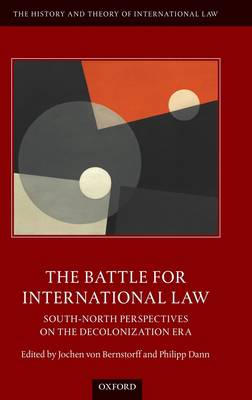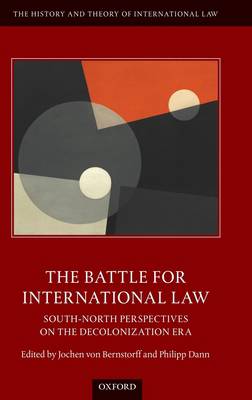
- Retrait gratuit dans votre magasin Club
- 7.000.000 titres dans notre catalogue
- Payer en toute sécurité
- Toujours un magasin près de chez vous
- Retrait gratuit dans votre magasin Club
- 7.000.0000 titres dans notre catalogue
- Payer en toute sécurité
- Toujours un magasin près de chez vous
Battle for International Law Htil C
South-North Perspectives on the Decolonization Era
Dann Von Bernstorff
187,45 €
+ 374 points
Description
This volume provides the first comprehensive analysis of international legal debates between 1955 and 1975 related to the formal decolonization process. It is during this era, couched between classic European imperialism and a new form of US-led Western hegemony, that fundamental legal debates took place over a new international legal order for a decolonised world. The book argues that this era presents in essence a battle, a battle that was fought out in particular over the premises and principles of international law by diplomats, lawyers, and scholars. In a moment of relative weakness of European powers, 'newly independent states' and international lawyers from the South fundamentally challenged traditional Western perceptions of international legal structures engaging in fundamental controversies over a new international law. The legal outcomes of this battle have shaped the world we live in today. Contributions from a global set of authors cover contemporary debates on concepts central to the time, such as self-determination, sources and concessions, non-intervention, wars of national liberation, multinational corporations, and the law of the sea. They also discuss influential institutions, such as the United Nations, International Court of Justice, and World Bank. The volume also incorporates contemporary regional approaches to international law in the 'decolonization era' and portraits of important scholars from the Global South.
Spécifications
Parties prenantes
- Auteur(s) :
- Editeur:
Contenu
- Nombre de pages :
- 488
- Langue:
- Anglais
- Collection :
Caractéristiques
- EAN:
- 9780198849636
- Date de parution :
- 24-12-19
- Format:
- Livre relié
- Format numérique:
- Genaaid
- Dimensions :
- 163 mm x 236 mm
- Poids :
- 907 g

Les avis
Nous publions uniquement les avis qui respectent les conditions requises. Consultez nos conditions pour les avis.






